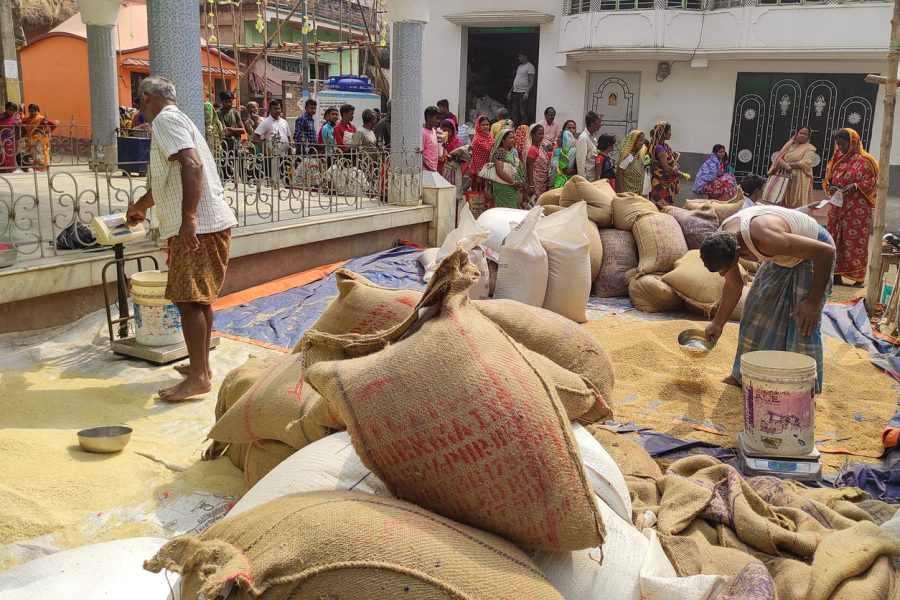
Politics over food: Why Centre wants to hog credit for subsidised ration

The Centre seeks to deny the state governments the liberty of topping up on the food grain subsidy provided by it in a bid to prevent the latter from taking credit for providing subsidised ration.
The development assumes significance in the wake of free ration, distributed by some of the state governments, becoming a crucial factor in bucking anti-incumbency in elections in those states.
The department of food and public distribution under the Ministry of Consumer Affairs, Food and Public Distribution prepared a proposal in this regard for a cabinet approval, sources said.
Also read: India must act fast to protect economy from global fallout of war
As per the draft proposal, no state government should top up subsidies on the central government’s food distribution scheme. The additional subsidy that some of the states provide could, however, be given separately to beneficiaries through direct benefit transfer (DBT) mode, the ministry proposed.
The 18-page draft stated that some states/ Union territories either provide the grains at free of cost or prices lower than the Centre’s fixed price of ₹3 per kg of rice and ₹2 per kg of wheat. Some other states and Union territories have increased the monthly quota of 5kg food grains per person, stipulated by the Centre under the National Food Security Act (NFSA).
“Under the PDS, commodities such as wheat, rice, sugar and kerosene are being allocated to the states and Union territories for distribution. But some states/UTs also distribute additional items of mass consumption through the PDS outlets such as pulses, edible oils, iodized etc.,” the ministry noted.
To mitigate the COVID-induced economic hardship, the Centre, however, is currently providing free ration under Pradhan Mantri Garib Kalyan Anna Yojana (PMGKAY). The scheme has been recently extended by six months till September this year.
The West Bengal government has rechristened the food distribution scheme as Khadya Sathi. Under the scheme, it provides free ration to the state’s about 6.2 crore ration cardholders.
The ministry in its draft proposal also took a serious note of the door-step ration delivery started by states like West Bengal, New Delhi and Andhra Pradesh.
It said distribution of ration should be strictly restricted to fair price shops, adding that the doorstep delivery of ration violates provision of the NFSA and will also have adverse impact on the implementation of the one-nation, one-ration-card scheme of the Union government.
This is not the first time the Centre took exception to states taking credit for its food distribution schemes. Then Union food minister Ram Vilas Paswan in 2017 had directed the states to display at the fair price shops the quantum of subsidies borne by the Centre and states so that the state governments could not take full credit of the schemes, Bengal officials said.
The officials said the state government would raise objections to the proposed change at the “appropriate forum.”
The officials said the NITI AAYOG, the Centre’s think tank, for long has been asking the Union government to cut down the coverage under the NFSA. But the Centre could not follow the recommendation, fearing it will have adverse political impact for the BJP if the opposition-ruled states do not follow the suit and hence the move to homogenise the scheme.
Also read: Pros, cons, costs and implementation dynamics of mandatory MSP
To cut down on the Centre’s food subsidy bill, the NITI AAYOG had proposed that the rural coverage under the NFSA should be reduced to 60 per cent from the current 75 per cent and urban coverage to 40 per cent from 50 per cent, sources added.
In the Union budget 2022-23, the Centre has allocated ₹2.06 lakh crore for food subsidy, which is around 28 per cent less than the revised estimate of the last fiscal.
The revised estimate in 2021-22 was ₹2.9 lakh crore. This means the Centre spent 47 per cent less in food subsidy then ₹5.41 lakh crore it had spent in 2020-21.


